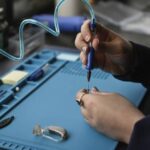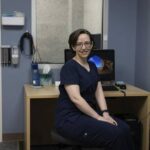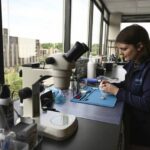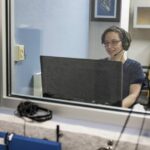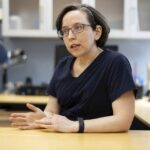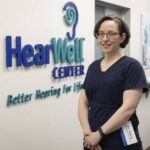For Suzanne Yoder, who grew up hearing impaired and now owns her own audiology practice, getting cochlear implants changed her life.
“I don’t like to use the word ‘miracle’ too lightly, but for me, it was a miracle — because it gave me back my independence,” she said.
Cochlear implants are electronic devices that are surgically placed and can provide a sense of sound to those with severe to profound hearing loss.
An audiologist treats people with hearing problems, from mild hearing loss to people who might need hearing aids or cochlear implants, said Yoder, who is the president of her practice, the HearWell Center in Wilkins, and has a doctor of audiology professional degree.
Yoder emphasized that hearing aids and cochlear implants do not give a patient normal hearing — but rather, the ability to hear sound.
“You still are dealing with a damaged hearing organ,” she said, referring to the distorted information that comes through patients’ ears. “We have to teach them how to live with that.”
Yoder used hearing aids for more than three decades. Throughout that time, she said her hearing gradually worsened.
“(My) preschool teacher called my parents (and) said, ‘She’s not responding when we call the kids out for story time. I think you’d better get her tested’,” said Yoder, who attended Beaver Area School District and now lives in North Braddock.
She said she got to a point where the hearing aids were no longer helping, as she had to have people in college take notes for her in class and others take phone calls for her and relay the information.
“I was really struggling,” Yoder said. “I was constantly lip reading, constantly relying on captioning — I wanted to be more independent.”
When getting cochlear implant surgery, she explained that the ears are typically operated on at separate times due to the risks involved. She got one ear surgery six years ago, and the other surgery five years ago.
“There’s always a chance that it won’t work,” Yoder said. “Knowing I could lose all my natural hearing all at once is just way too scary, so generally, they will just do one ear at a time, get you rehabilitated, then do the other side.”
Rehabilitation can take a long time — the average time is 12-18 months — as hearing with an implant is “totally different,” according to Yoder. This is because the patient has to retrain their brain, similar to someone who has a stroke and has to learn how to walk again, she said.
“You’re basically starting from the beginning learning how to hear again,” she said. “Your brain’s basically recoding how to hear from the ground up.”
Through cochlear implants, patients hear through electrical stimulation, Yoder said.
“At first, when it was turned on, it just sounded like a constant whistle and my brain wasn’t able to interpret it at all,” she said. “It sort of sounded … very, very high pitched, squeaky … a little bit robotic.”
But she saw improvement every week, and her brain was able to adjust in about eight months due to her accelerated rehab and prior audiologist training.
“Now, it just sounds normal,” Yoder said. “I called it my baby ears like I’ve been born again — taught it how to do its thing, and now, we’re back up to speed.”
Cochlear implants, she said, are becoming more commonplace. Daisy Kent from “The Bachelor” was vocal about her experiences with hearing loss and her cochlear implant surgery while she was on the show this past season.
Without getting cochlear implants, Yoder said she probably wouldn’t have expanded her practice at the HearWell Center.
“I can’t tell you how much phone phobia I was having because I relied on lip reading … so, I wasn’t able to feel comfortable making calls with my patients or making calls for the business or calling another doctor,” Yoder said. “I don’t feel like I’m being held back by my hearing loss anymore.”
Experiencing hearing loss herself has made her job as an audiologist more impactful because she’s able to relate more to what patients are experiencing, Yoder said.
“Growing up with hearing loss was a little bit lonely, to be honest, because I didn’t know other people my age with hearing problems,” Yoder said. “I didn’t really know there were a lot of people out there with hearing aids like myself.”
An auditory impact
Yoder opened the HearWell Center in 2007 at its former Forest Hills location. She recently moved the center to Wilkins in mid-February in order to expand.
“We ran out of space,” she said.
She was the sole provider for 17 years before hiring another audiologist and two assistants, who work at the center today.
Lauren Swatzler, the other audiologist at the HearWell Center, met Yoder in 2021 when Swatzler was studying at the University of Pittsburgh.
“I had been interested in private practice,” she said. “(I) ended up spending almost a full year with (Yoder) as my clinical instructor.”
She then found out her dad had hearing loss, which she said her family had always known, but she had been watching him go through the process. That’s when she made the choice to get her clinical doctorate in audiology.
“He decided not to get hearing aids, so I made it my life’s mission to get this man … hearing aids,” Swatzler said. “If I can help people like my dad or people who have these hearing difficulties … that’s very meaningful work for me.”
Patient Jim Potter has found success with hearing aids through the HearWell Center.
“Everything’s just so much crisper and clearer,” he said. “It’s surprising how many people I’m starting to find out have them.”
Potter, 75, of Wilkins, said he’s had hearing issues for a number of years, but he was in denial about the situation. He said he wishes he pursued help years ago.
“It just opens up a world that I was missing,” he said, citing his need to constantly turn up the TV and his wife’s need to raise her voice while communicating with him. “I had gotten tired of saying, ‘Can you turn that up?’ or ‘Could you say that again?’”
The hearing aids, which he’s had for over two months, make Potter feel more comfortable in his everyday life, he said.
“If it’s vanity or embarrassment, get over it — go and get checked out; it’s going to change your life,” he said. “That sounds so strong, but it has opened up things to me that I was not experiencing for a number of years.”
The HearWell Center recently expanded to include treatment for tinnitus, which is ringing, buzzing and/or humming in the ear, Yoder said,.
“90 to 95% of the time, hearing loss is very straightforward — it just needs audiology in terms of support,” Yoder said.








